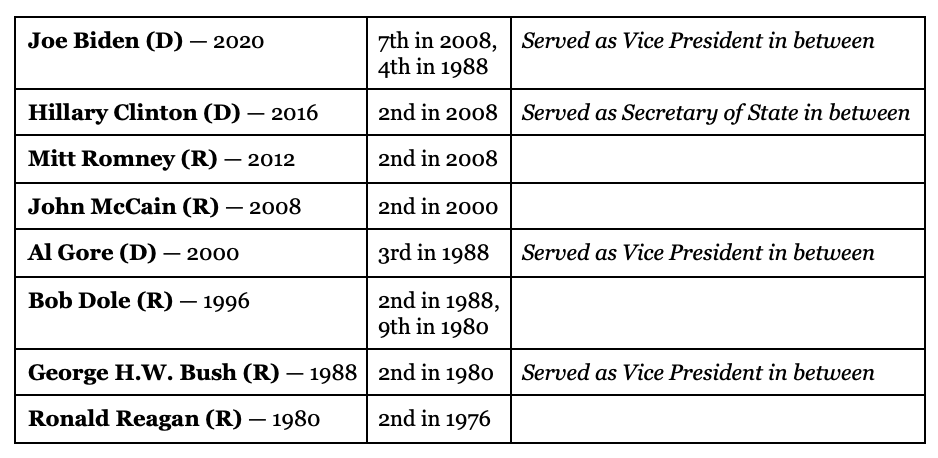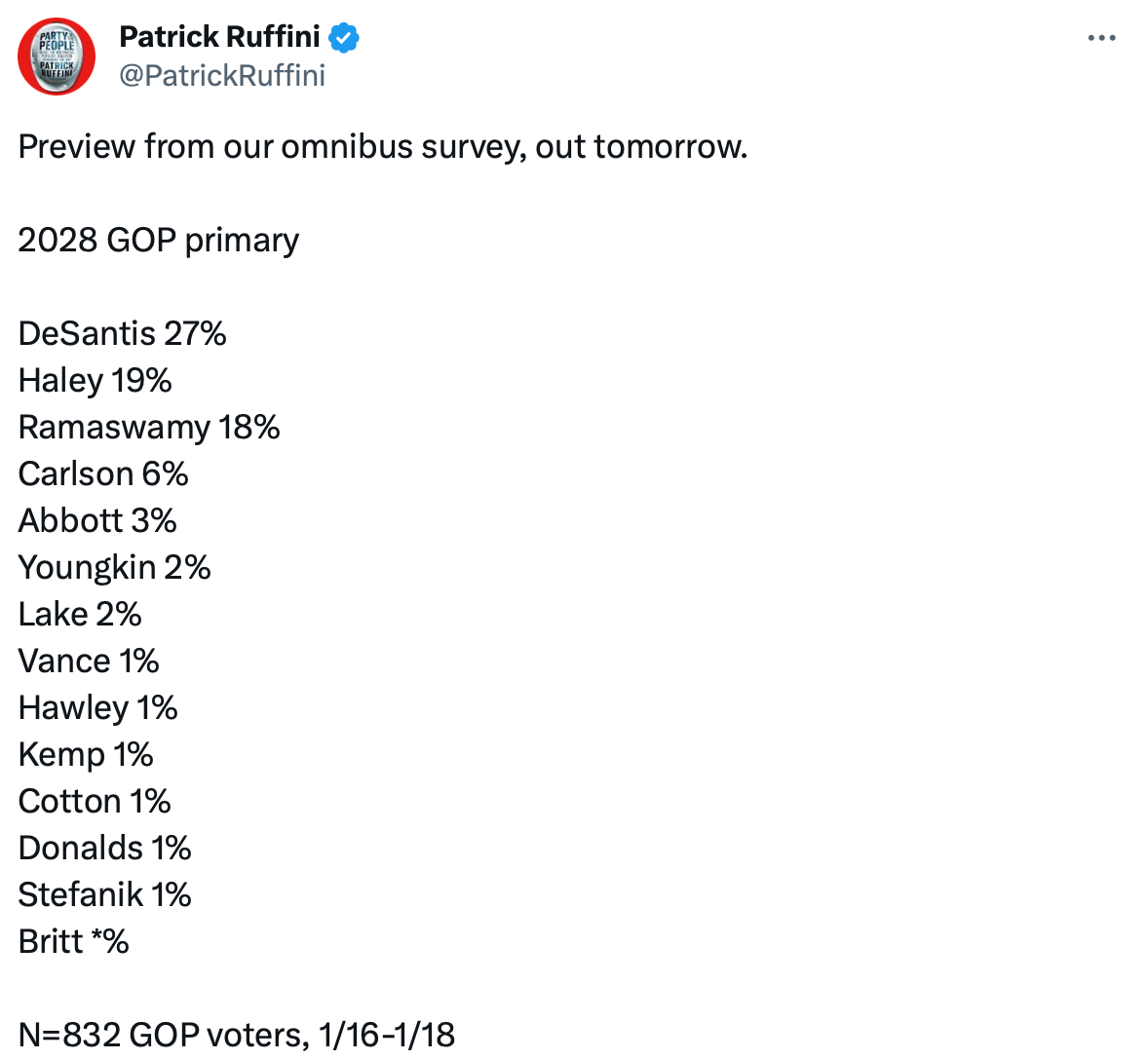“Yes, we want complete and total upheaval”
Fox News data chief Dana Blanton on why GOP voters thronged to Trump. Plus: Will DeSantis run in 2028?
Good morning! It’s Thursday, January 25, 2023. Election Day is 285 days away. If this newsletter was forwarded to you, subscribe here. If you want to contribute to support my work, donate here.
Donald Trump has won two consecutive Republican primary contests. Party leaders are beginning to coalesce behind him. But Nikki Haley refuses to quit.
Amid all that, I spoke yesterday to Dana Blanton, the senior vice president for public opinion research at Fox News.
Fox’s polling operation is one of the most respected around, and they’ve been collecting interesting data this year as part of their Fox News Voter Analysis, a sort of reinvented exit poll. Fox left the National Election Pool — the decades-old consortium of news organizations that collaborate on exit polling — in 2017, to start a new survey with the Associated Press that interviews voters over the course of several days before an election, in order to more accurately glean information about voters who might cast ballots early.
In the interview, Dana and I discuss:
How long ago Republican voters say they decided on Trump
How voters can view Trump as both a figure of the establishment and an agent of change
The divides that split the GOP
Whether Haley voters are a threat to Trump in November
And more
This interview has been edited for length and clarity.
We’re talking on the morning after the New Hampshire primary, and it certainly seems like Donald Trump has the nomination pretty much sewn up. So, I want to start by looking at the full arc of the data you’ve collected over the primary process. From what you see Republican voters telling you from the very beginning, do you think there was ever much of a chance for a contest or has it always been clear that we were heading for this result?
I think of course there was a chance for a contest. ... But one of the things that I thought was telling about the race last week in Iowa, and then again last night, was the number of people who [told us] they had known all along who they were going to vote for.
That’s called the “time of decision” question. A lot of times you’re asking it as an insurance policy, right? If something late in the game happens, you can look at the late deciders, the people who decided their vote in the last few days. This time, the question was interesting to me in kind of the opposite way, because we had such a large number saying that they’ve known all along and 8-in-10, 9-in-10 of those folks were going for Donald Trump. And so that kind of tells you about how we started this whole primary season with so many people already dug in.
Another of the questions you ask is about the qualities Republican voters are looking for in a president. What are you seeing there as the qualities that have led Republican voters to surge to Trump for a third time?
We ask about the list of qualities that I think that you would expect. We want to know the importance of things like empathy, cares about people like you, strong leadership. Is it about policies? Is it about bipartisanship?
The mental capability to serve effectively came out on top as the largest number: in both states, more GOP voters said that was very important than any other trait. To me, that’s with the current president in mind and having that be such a conversation, around the mental capability to serve.
Being a strong leader and electability are also clearly super important to these Republican primary voters, and Trump wins those groups by 2-to-1 last night. So when most people think that that’s an important trait in a candidate and then you win that group 2-to-1, that gives you the strong lead that he had last night.
The education split is really stark in your data in New Hampshire. You had 64% of non-college-educated voters going for Trump and 60% of college-educated voters going to Haley. How important do you think that divide is to understanding the Republican Party and its future? Are there other divides that jumped out to you?
I do think it's important and it is definitely a group that we will be watching... I think that one other question that has been great in explaining how Trump has dominated is a new question that we asked this time: “How much change are you looking for in how things are run in the country?”
We really pushed that category so we could get the variation, where you could say, “Oh, I want a little bit of change” or “I want substantial change.” And then that final category is “complete and total upheaval.” And so what we’re seeing is about 3-in-10 of these primary voters are saying, yes, we want complete and total upheaval. We want big, big, big change. And 8-in-10 of those go for him.
That group being so strongly for Trump is what wins him elections with a big exclamation point. They think that he is the person who can do that; they do not think of Ron DeSantis or Nikki Haley as being able to do that. That’s a new question that we found valuable this year.
One thing that I found interesting in your Iowa polling is the question you asked about which candidate most represents the Republican establishment. And the candidate that 44% of Republicans, a plurality, said was Trump. But then you also have responses to another question, as you just said, that he represents change to so many voters. How is it that voters are both acknowledging he is the party establishment and also viewing him as the change candidate?
I agree that was such an interesting combination of how you can acknowledge that of course, he was a former president, he was in Washington for four years, and at the same time, he is still that agent of change and the person who they think is going to go in and shake it up and they don’t see other candidates being able to do it the way that he would.
It was a very interesting comparison, I thought as well, and also, for them, a truth they’re willing to accept: how can you not think that a former president would be part of [the establishment]?
In Iowa, you had 20% of Republican caucusgoers say they wouldn’t vote for Trump in November. In New Hampshire, that number went up to 35%. Of course, the Republican primary included some non-Republicans, but that’s still a big number of GOP primary voters saying they would vote against Trump if he’s the nominee. How worried should Republicans be seeing these numbers in your analysis?
Well, the way I think about it is, it’s January. It’s the primary. It’s a long way for them for them until the election. So, they feel that way today. We’ll see after 10 months of an election. Often, you hear the phrase “they come home”: if [Trump and Biden] are their choices [in November], then they’re going to vote for the Republican nominee of their party.
What we don’t know is how many are dead set on that. And campaigns matter. We don’t know what’s going to happen. We don’t know what will happen with third party candidates getting in. There’s just so much that we don’t know right now. But this would be something that you would look at and work on. But I don’t know how much I would worry about it right now. It’s something to notice and think about and be aware of, and at the same time, it’s as of today, like every survey.
Obviously, we can’t know for sure, but just as a shorthand, where do you think that number can be for Trump to still win? How large of a defection from his party can he afford to still have in November?
Goodness, I don’t think I want to guess on that. I don’t think I want to try and game that out for you. I don’t know.
Is there anything, over the course of taking data this cycle, that you’ve learned about Republican voters that’s surprised you?
The upheaval question. That was a really interesting finding and really telling. I’m really grateful that we asked that question. And I think that that is more of a “Fox question,” if you will. That’s something that we like to pride ourselves on, asking questions that really get to the crux of things and maybe are worded in such a way that are more like how everyday people talk. They just want to go in there and completely shake things up, completely bring about big change.
Are there other questions you consider “Fox questions,” that you think are unique to your polling?
One of the questions that we love and ask a lot is, it’s kind of a “role of government” question, but instead of asking the traditional question of “Do you want the government doing more things or less,” we like to ask it as “What message would you send to the government? Lend me a hand or leave me alone?” We ask it more in a way that people might talk about it, in less of an academic way, if you will.
The things that make our survey different, for the Voter Analysis and the VoteCast that we work on with the Associated Press, there are many advantages to the questionnaire because of how we ask it. We just benefit so much from being able to, on our issues list, have more than the four items the exit poll is forced to have because of needing to fit it on one piece of paper that you’re handing the person. We had seven issues on the issues list.
We can do follow up questions. On party ID, we can ask about leaners, so we get a better read on how many people are truly, truly independent and don’t lean one way or the other. We can do intensity on all of the questions. We’re just so pleased with the new method and all the benefits that we get from it.
Ask Gabe: Second time’s a charm?
Josh K. asks: “Perhaps I’m wrong, but DeSantis is simply positioning himself for 2028 [by dropping out and endorsing Trump]. Thoughts?”
I certainly wouldn’t be surprised if Ron DeSantis runs for president again in 2028. He’ll be term limited as governor after 2026; what else will there be to do? Reportedly, he’s already begun laying the groundwork for a future run.
It should also be noted that there is a long lineage of presidential candidates losing in the primaries, only to come back and win their party’s nomination four (or more) years later:
Looking back at this list, though, I’m not sure how comfortably DeSantis would fit into it. For one thing, you’ll notice that most of the candidates who have pulled off a comeback ended in second place the previous time they ran. DeSantis will go down as the third-place finisher in this year’s primaries, having won a grand total of nine delegates.
More than that, he’ll go down as having significantly underperformed expectations in his first run, unlike comeback candidates like John McCain in 2000 or George H.W. Bush in 1980. (And done so without at least battling it out to a close race, like Hillary Clinton in 2008.) There are ways to lose like a loser, dooming your career prospects, and ways to lose like a winner, setting yourself up for future success. There’s a reason you don’t see Scott Walker or Jeb Bush on the above lists.
Still, I’ll grant that this is a weird primary, and it’s not as though presumptive second-place finisher Haley is poised to do much better against Trump. (She currently has 17 delegates.) Maybe DeSantis’ 2024 loss, against such a towering opponent, will be forgiven by his next run.
But the other thing I’d note is that many of the primary losers-turned-nominees (especially those who finished worse than second) had plum jobs that elevated their profiles in between, as VP or Secretary of State. (Does anyone think Joe Biden would have gone from finishing 7th in 2008 to winning the presidency in 2020 without an interim tour as No. 2?) Trump may have retired the nickname “DeSanctimonious,” but a spot on the ticket still seems a far way off. So this route to political resurrection seems closed off for DeSantis.
That leaves the Reagan route: finishing out his term as governor, and then emerging as a conservative movement leader in the intervening years until the next primary. But, much as DeSantis may have tried to style himself in Reagan’s mold, if we learned one thing this year, it’s that he’s no Great Communicator.
More than the historical antecedents (previous primaries offer a small sample size), that’s ultimately why I’m dubious about DeSantis ’28. One of the polls that has most stuck with me throughout this election cycle was the New York Times/Siena survey that found 54% of Republican voters described Trump as “fun” — while only 16% said the same about DeSantis.
DeSantis tried to run with a Trumpian ideology, but stripped of the entertainer personality that endeared Trump to GOP voters in the first place. Early 2028 polls show DeSantis with a slight edge (yes, they’re already polling 2028) — an important reminder that most Republican voters still do like DeSantis, even if they like Trump more. But my guess is that his advantage can mostly be chalked up to name ID. Put up against someone with the “fun” factor in 2028, it’s not clear why DeSantis would do much better than he did this time.
Also, that poll left out a crucial name. If he loses this November, who’s to say Trump himself won’t be the “fun” candidate again in 2028?
More news to know.
Middle East: “Israel and Hamas broadly agree in principle that an exchange of Israeli hostages for Palestinian prisoners could take place during a month-long ceasefire, but the framework plan is being held up by the two sides' differences over how to bring a permanent end to the Gaza war, three sources said.” — Reuters
“Israel denies attack on UN refuge in Gaza that drew rebuke from Washington (Reuters)
“US and Iraqi governments expected to start talks on future of US military presence in the country” (CNN)
“How Yemen’s Houthi Attacks Are Hurting the Global Supply Chain” (Bloomberg)
“Pentagon estimates Middle East buildup since Oct. 7 cost $1.6B” (Politico)
Campaign 2024: “The United Auto Workers announced its endorsement of President Biden on Wednesday, a key, if expected, show of support as the president hones in on the general election.” — CBS
Border: “Texas is apparently taking advantage of a loophole in a recent Supreme Court ruling involving the US-Mexico border in order to keep putting up more razor-wire fencing along the Rio Grande riverbank.” — Business Insider
SCOTUS: “The Supreme Court declined to intervene to stop Alabama from using nitrogen gas to execute a death row inmate, allowing for the execution to be carried out using the method Thursday for the first time in the United States.” — The Hill
Health Care: “More than 21 million people have signed up for health plans through the Affordable Care Act’s health insurance marketplaces, the Biden administration announced Wednesday. The record level of enrollment comes as former president Donald Trump, seeking the GOP nomination, is again vowing to repeal the program if elected.” — WaPo
More headlines:
“The Third Foreign Connection in Bob Menendez’s Spiraling Scandal” (The Daily Beast)
“Republicans Turn on Their Impeachment Chairman” (The Messenger)
“Hunter Biden’s paintings have sold for a total of $1.5 million” (WaPo)
“Ohio Senate overrides governor’s veto of transgender care restriction” (NBC)
“Arizona GOP chair resigning after Kari Lake recording surfaces” (Axios)
The day ahead.
White House: President Biden will deliver remarks on infrastructure at a brewery in Superior, Wisconsin. VP Harris will headline a campaign fundraiser in Sacramento, California. First Lady Biden will deliver remarks at a White House event on gun violence prevention.
Congress: The Senate will vote on confirmation of a district judge nominee, and on advancing a district judge nominee and a circuit court nominee. The House is on recess.
Supreme Court: The justices have no oral arguments scheduled this week.
Thanks for reading.
I get up each morning to write Wake Up To Politics because I’m committed to offering an independent and reliable news source that helps you navigate our political system and understand what’s going on in government.
The newsletter is completely free and ad-free — but if you appreciate the work that goes into it, here’s how you can help:
Donate to support my work or set up a recurring donation (akin to a regular subscription to another news outlet).
Buy some WUTP merchandise to show off your support (and score a cool mug or hoodie in the process!)
Tell your family, friends, and colleagues to sign up at wakeuptopolitics.com. Every forward helps!
If you have any questions or feedback, feel free to email me: my inbox is always open.
Thanks so much for waking up to politics! Have a great day.
— Gabe








